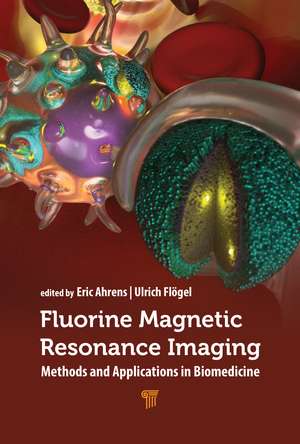Fluorine Magnetic Resonance Imaging: Methods and Applications in Biomedicine
Editat de Eric T. Ahrens, Ulrich Flögelen Limba Engleză Hardback – 11 oct 2024
This book is an interdisciplinary compendium detailing cutting-edge science and biomedical research in the emerging field of 19F MRI and includes technical issues, such as pulse sequence considerations and limits of detection of the techniques; synthesis of novel 19F MRI tracer agents; inflammation, cancer, and stroke imaging; regenerative brain repair; theranostic nanomedicine; and clinical perspectives. The book will appeal to investigators involved in MRI physics, biomedicine, immunology, pharmacology, and probe chemistry as well as general readers.
Preț: 1605.68 lei
Preț vechi: 1690.19 lei
-5% Nou
Puncte Express: 2409
Preț estimativ în valută:
307.29€ • 319.63$ • 253.68£
307.29€ • 319.63$ • 253.68£
Carte tipărită la comandă
Livrare economică 14-28 aprilie
Preluare comenzi: 021 569.72.76
Specificații
ISBN-13: 9789815129373
ISBN-10: 9815129376
Pagini: 314
Ilustrații: 76
Dimensiuni: 152 x 229 mm
Greutate: 0.59 kg
Ediția:1
Editura: Jenny Stanford Publishing
Colecția Jenny Stanford Publishing
ISBN-10: 9815129376
Pagini: 314
Ilustrații: 76
Dimensiuni: 152 x 229 mm
Greutate: 0.59 kg
Ediția:1
Editura: Jenny Stanford Publishing
Colecția Jenny Stanford Publishing
Public țintă
Academic and PostgraduateRecenzii
“Since the previous book by the editors on this subject, the field of 19F MRI has continued to grow at a rapid pace. This book provides a comprehensive overview of the latest developments in the chemistry of fluorinated nanoprobes, methods of improved detection, and cellular and molecular imaging applications—a must-read for those in and entering the field.”
Jeff W. M. Bulte
The Johns Hopkins University School of Medicine, USA
Jeff W. M. Bulte
The Johns Hopkins University School of Medicine, USA
Cuprins
1. Polymeric 19F MRI Agents: Designing Responsive Imaging Agents 2. Nanofluorides: Inorganic Fluoride Nanocrystals for 19F MRI 3. Multibranched Superfluorinated Molecular Probes for 19F MRI 4. Development of Perfluorocarbon-Encapsulated Silica Nanoparticle as 19F MRI Tracer Agent 5. Perfluorocarbon Theranostic Nanoemulsions: From Imaging to Treatment of Inflammatory Diseases and Pain 6. Choosing and Optimizing a Pulse Sequence for Fluorine-19 MRI 7. 19F for Quantitative Tracking of Immune Cells Involved in Cancer Progression and Therapy 8. Noninvasive In Vivo Imaging of Neutrophil Trafficking by 19F MRI 9. 19F MRI to Map the Spatio-Temporal Infiltration of Immune Cells in Stroke and Tissue-Regeneration 10. Sensitivity and 19F MRI Cell Tracking
Notă biografică
Eric T. Ahrens is a professor of radiology at the University of California San Diego and the director of Stem Cell Molecular Imaging at the Sanford Consortium for Regenerative Medicine, California, USA. His research focuses on adapting non-invasive imaging methods to visualize specific cell populations in the body. He has pioneered MRI-based cell-tracking materials and methods that have been adopted by numerous investigators worldwide. Innovations by his laboratory include the synthesis of functionalized perfluorocarbon-based nanoemulsion probes for sensitive MRI, PET, and fluorescence detection. He led a team that developed a novel clinical perfluorocarbon 19F MRI cell-tracking agent and performed first-in-human studies to visualize the fate of cancer cell therapy grafts post-transfer. He has authored more than 100 scholarly publications in the fields of physics, chemistry, biology, and biomedicine and is an inventor on 12 patents.
Ulrich Flögel is a professor for experimental cardiovascular imaging at the Department of Molecular Cardiology, Heinrich-Heine University of Düsseldorf, Germany. His research focuses on the interplay of function, energetics, metabolism, and inflammation as well as their role in the development of cardiovascular disease using innovative multinuclear MRI/MRS techniques, particularly 19F tracers. His efforts have established a broad molecular imaging platform that can track inflammatory and thrombotic processes with high specificity in parallel to metabolic and energetic alterations together with in-depth tissue microstructure characterizations.
Ulrich Flögel is a professor for experimental cardiovascular imaging at the Department of Molecular Cardiology, Heinrich-Heine University of Düsseldorf, Germany. His research focuses on the interplay of function, energetics, metabolism, and inflammation as well as their role in the development of cardiovascular disease using innovative multinuclear MRI/MRS techniques, particularly 19F tracers. His efforts have established a broad molecular imaging platform that can track inflammatory and thrombotic processes with high specificity in parallel to metabolic and energetic alterations together with in-depth tissue microstructure characterizations.
Descriere
The book will appeal to investigators involved in MRI physics, biomedicine, immunology, pharmacology, and probe chemistry as well as general readers.
